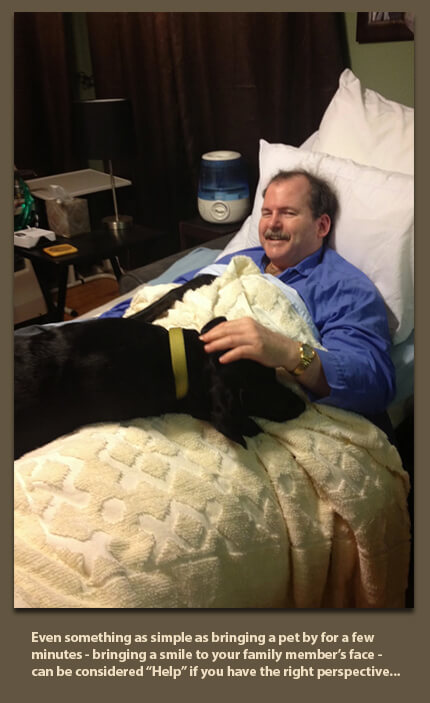Part 1 of 3: Recognizing Help in Caregiving Situations
Part 2 of 3: Recognizing Help in Caregiving Situations
Summary: In the first part of this three-part series we explored Defining Help. In the second of this series on help we discuss what it means to recognize help in a caregiving situation. See part three “Refusing Help.”
Author: Trish Hughes Kreis exclusively for Assisted Living Directory
Sometimes it may seem like a family member or friend is not helping but seen from a different perspective help may actually be there.

In my own caregiving situation, let’s use my brother as an example for no other reason than this is a fairly clear-cut case of being able to recognize help (plus, he’s a good sport).
I care for my disabled brother, Robert, and we have one other sibling, Rich. Rich doesnt take Robert for overnight visits or do clean up duties in the bathroom when he is visiting me and Robert. Does this look like he isnt helping? From one perspective, it could look that way. Does this actually mean he is not helping? Absolutely not!
What it means to me is that Rich is extremely uncomfortable with the amount of personal care that Robert needs. I am okay with that. Rich has other strengths so why would I want to get mad at him because he doesnt help in a certain, preconceived way? Rich helps me and Robert in other ways.
He is incredibly supportive and has been a rock for me throughout our lives I needed someone to help me deal with our crazy parents and a special needs brother. When I needed financial guidance when I was a single mom he helped me create a budget that worked for me and got me through that difficult time (even generously, on occasion, helping out with no-strings-attached money and gifts). When I need a big ticket item for Robert, Rich doesnt question it he asks how much he should send. Rich pays for respite care when paid care is unavailable.
This help comes even without me threatening to drop Robert at his house (although I am not above making threats). Rich doesnt help Robert in every way that I do but he does help.
I am not going to be upset with Rich because he won’t take Robert to the bathroom. I don’t see a glass half-empty of no help because I choose to see that he provides help in other ways that I need and want and that benefit our brother, Robert.
In the thick of a caregiving situation, it is more difficult to recognize help when it arrives. Here are a few tips to consider when looking for help.
1. Stop Before Reacting. It helps to take a minute and assess the situation before reacting. If someone is offering assistance that seems absolutely worthless, ask questions. Maybe that offer of help can be turned into help that is actually useful. Is a friend offering to bring brownies for dessert but you or your caree is diabetic? It would be easy to be upset with this friend since you have talked about your caree’s diabetes numerous times. Instead, thank them for the offer, assume they have their own struggles at home and have forgotten about the diabetes and ask if they would like to come over (without food) and sit with you and your caree for an afternoon.
2. Manage Expectations. Wishing a sibling will stay an entire weekend with the mom you care for might make you miss the opportunity for the sibling to visit for a few hours on a Saturday afternoon.
3. Delete Should from Your Vocabulary. My siblings should call more can be turned into, My sister called and talked with mom which made her happy the rest of the evening. The staff at the Assisted Living Facility should talk to me even if it’s during a shift change could become, The staff will have more time to discuss mom’s care if I call during a less busy time.
4. Connect with Other Caregivers. Sometimes we can get so caught up in our own world of caregiving that we forget there are millions of other people in a similar situation. Connect with other caregivers and share ideas about getting and recognizing help.
5. Caregiving is Not a Competition. Caregivers often times compare their situation to another caregiving situation. This can lead to a caregiver thinking they dont need as much help as another caregiver because my situation isnt as bad. Each caregiving situation is unique and can change in the blink of an eye. Help that was not needed yesterday might be needed today. You are the best judge of what help is needed and when not someone else in a similar, yet completely different situation.
6. Speak up. Caregivers are experts in organization, crisis management, prioritizing and slogging through red-tape. It probably seems as if you have it all together and sometimes we convince ourselves that we do. The very fact that we have it together is what prevents others from offering to help. Help wont magically come just when we need it we have to recognize when to ask for it.
7. Be Open to Help That Looks Different. It is important to keep in mind that allowing others to help in their own way opens the door for them to contribute to the care of the caree in a way that is comfortable for them. Others may not help how we want them to but maybe how they are helping is good enough. Of course, safety, dietary restrictions and medication schedules must be followed but let the little care differences go.
Recognizing help when it arrives can be a challenge but ultimately is beneficial to everyone involved. In the final segment of the Help series, we will discuss why it is okay to say no to help sometimes.
See the first part of this series is on defining help
See the third part of this series is on refusing help
Article by Trish Hughes Kreis exclusively for Assisted Living Directory
Comming Soon:
No Obligation
Assisted Living with Part 1 of 3: Recognizing Help in Caregiving Situations



